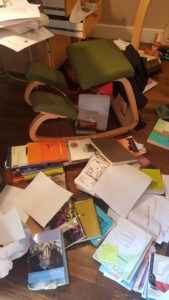When I started this blog nearly a decade ago I called it “Associations.” The term invoked the “what” and the “who” of the endeavor.
What: occasional musings about connections between writing and knowing, between writing and community, between writing and being.
Who: me as a writer trying to write, or at least the “me” that is an academic.
That’s my official title: “Associate Professor of English.” And as I return to this blog after some time and consider what’s next, I thought to consider the term and the title “associate.”
Faculty hired right from or soon after earning their Ph.D. programs are most likely to start off as “Assistant professors.” An Associate professor is the promotion that usually comes after the professor has received tenure. This happened for me seven years after my initial hire (which was, at that time, considered delayed; my tenure “clock” stopped when my childcare clock rang).
It’s perfectly respectable to be an Associate professor. For the last decade plus (plus) I’ve quite enjoyed being just that. But it’s a “mid” level rank. ChatGPT actually used this term “mid” to define my position. (I love when A.I. and slang collide.)
“Mid” has a neither here not there status. You aren’t meant to hang out too long in mid-land. You’re supposed to keep moving. Up. To “Full.”
It takes considerable work to make it to this next, last level in the academic ladder. And there are good reasons to want to be Full. Full comes with a (modest) salary bump and (also modest) prestige.
Still, the term “full” lacks poetry. A reward for moving up is to get stuffed? To have had enough? Of what? I’m moved by “associate” and motivated by professor. But “full” just doesn’t inspire.
And yet there are a lot of full professors out there. They make up a small majority of the academic workforce. 26.4% of these highest-ranked professors teach in American colleges and universities while 22.7% of us are Associates. This surprised me.
There is more to say about the status of college labor force and the role of tenure and non tenure-track ranks in the academy. For now though I’ll stay with the discovery that there are more Full professors than Associate.
I’m surprised by this because everyone I seem to know (well) in academe is either differently ranked–a lecturer, an adjunct (see above about labor)–or they’re like me, an Associate. These are the scholars I write with, the colleagues I committee alongside. What do we have in common? Well all of us are more likely to be mentors, directors of programs and projects, and…women, as this 2023 Inside Higher Education reports. My experience tells me another shared trait is that we’re all pretty “associative.” We work independently on research and teaching but we also spend a good part of our energy trying to connect our scholarship to each other, to students, to communities not necessarily fully engaged with or embraced by higher education. In my case, that means organizing around K-12 literacy access. In one of my colleague’s case, it means helping to set up urban gardens, something she knows about because of her studies in sustainability.
To be sure, many Full professors do this connective work too, even if they are at the satiation point of their academic career. Yet it must feel different. And as I prepare my application to become Full professor I wonder what might get lost if I am awarded this promotion and no longer officially engage in academic activities from the “mid” place: where we look ahead, behind, and also all around.




